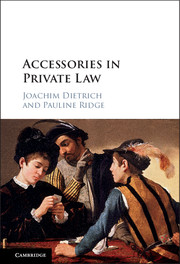Book contents
- Frontmatter
- Dedication
- Contents
- Foreword
- Preface
- Table of cases
- PART I General principles
- PART II Accessory liability in private law
- 5 Torts
- 6 Breach of contract
- 7 Infringement of equitable property rights
- 8 Breach of equitable duties
- 9 Infringement of statutory intellectual property rights
- 10 Other statutory wrongs
- 11 Wrongs involving companies
- PART III
- Index
8 - Breach of equitable duties
from PART II - Accessory liability in private law
Published online by Cambridge University Press: 05 February 2016
- Frontmatter
- Dedication
- Contents
- Foreword
- Preface
- Table of cases
- PART I General principles
- PART II Accessory liability in private law
- 5 Torts
- 6 Breach of contract
- 7 Infringement of equitable property rights
- 8 Breach of equitable duties
- 9 Infringement of statutory intellectual property rights
- 10 Other statutory wrongs
- 11 Wrongs involving companies
- PART III
- Index
Summary
Introduction
Overview
The principles governing accessory liability for breach of an equitable duty are to be found within the broader principles that govern third-party participatory liability in equity. This chapter sets out the principles of accessory liability within that broader context, including recipient liability. The law governing accessory liability specifically, and participatory liability generally, is confused in some respects and differs across jurisdictions. The confusion is attributable in part to the extraordinary influence of one nineteenth-century Court of Appeal in Chancery decision, Barnes v. Addy, and specifically, Lord Selborne LC's ex tempore leading judgment. Barnes v. Addy concerned claims against two solicitors who acted in relation to the appointment of a sole trustee to a testamentary trust. The beneficiaries sought redress against the solicitors for the trustee's misappropriation of the trust fund. Lord Selborne was anxious to protect professional agents, particularly solicitors and bankers, acting honestly ‘as the agents of trustees in transactions within their legal powers’ and dismissed the beneficiaries’ appeals. His Lordship did not purport to change the law or to expound generally on the liability of third parties to breach of trust. Nonetheless, during the latter part of the twentieth century, his brief statement as to two exceptional circumstances in which agents of trustees would be liable for a trustee's breach of trust transmogrified into an inflexible template for equitable participatory liability generally, regardless of whether the participant was an agent or not and irrespective of the nature of the participant's conduct or the primary wrong in question. A distinction was drawn between participants who were involved in the primary wrong through knowingly receiving trust property and those who assisted in egregious breaches of trust (later extended to breach of fiduciary duty more generally) without necessarily receiving property. Little or no attention was paid to primary wrongs other than breach of trust and fiduciary duty. The so-called ‘two limbs’ of Barnes v. Addy were often applied in a formulaic and literal fashion. This need not have been so. In contrast to the jurisdictions focused upon in this chapter, the Barnes v. Addy template has not dominated the United States’ jurisprudence on the topic.
In recent times, there has been a move away from the Barnes v. Addy template in most jurisdictions, but with mixed results. Broadly speaking, there are currently two frameworks used to determine participatory liability for breach of trust and fiduciary duty.
- Type
- Chapter
- Information
- Accessories in Private Law , pp. 217 - 303Publisher: Cambridge University PressPrint publication year: 2016



